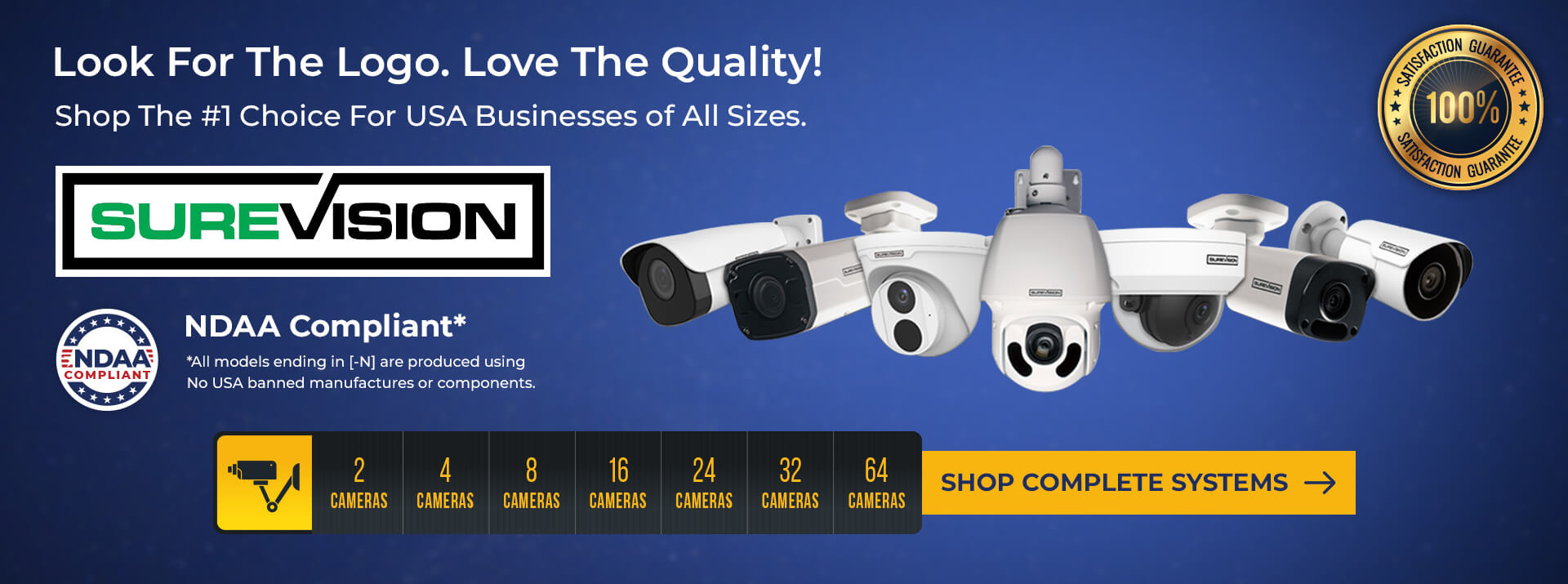Risks of Dahua & Hikvision Non-NDAA Approved Security Camera
Sep 4, 2023

Dahua and Hikvision collectively control most of the global market for business-grade security cameras. They're both Chinese manufacturers that sell under their own brands while also white-labeling for several big box retailers, such as Lorex and Ezviz, which are American brands. Despite the global popularity of security cameras and systems from Dahua and Hikvision, they're not NDAA-compliant. What does this mean for you as a business owner or security camera installation contractor?
If you own a business that installs security cameras in government buildings like police stations or works with any government-funded entity like car manufacturers or non-profits that take government contracts, NDAA compliance may be a requirement for your projects. Dahua and Hikvision products are not NDAA-approved, meaning you cannot use them in government buildings or at locations processing government contracts.
Here, we'll look at the risks of using non-NDAA-compliant security cameras and why you need to consider security cameras approved by the National Defense Authorization Act (NDAA).
They May Not Be as Secure as You Think
These cameras often have known security vulnerabilities that hackers can exploit. For example, non-NDAA compliant Dahua and Hikvision cameras may be susceptible to hacks that allow remote access to the camera's feed. A hacker could potentially view your camera's feed from anywhere.
These cameras use high silicon chipsets that are forbidden by section 889 of the NDAA. These chipsets have caused cybersecurity issues in the past and pose the risk of being backdoor accessible, which makes them a prime target for hackers. NDAA-compliant solutions like SureVision cameras by CCTV Security Pros are a much safer option because they use M-Star chipsets that are NDAA-compliant.
They May Not Comply with Laws & Regulations
Non-NDAA approved Dahua and Hikvision security cameras may not comply with laws and regulations. This is particularly true for businesses that must comply with the National Defense Authorization Act (NDAA). That's because these cameras are often not compliant due to their vulnerabilities. As a result, you could be opening yourself up to potential lawsuits if you use these cameras at your business.
If your business engages in any government-funded work or federal-related projects, you need to be aware of the NDAA and its requirements. If you are an automotive manufacturer, the cameras at your plant may need to be NDAA compliant before you can legally accept a contract to make police cars, for example.
Dahua and Hikvision cameras do not meet NDAA requirements, so if you're using them, you could be in violation of the law. This could result in severe penalties for your business, including fines and legal liability.
They Could Cost You More Money in the Long Run
With non-NDAA Dahua and Hikvision security cameras, you may have to replace your camera system sooner than you would have if you had invested in higher-quality or security cameras that meet compliance requirements. The cost of installing a commercial-grade security system can be significant, so you want to ensure you get a system that will last.
Investing in Dahua or Hikvision cameras may seem like a cost-effective solution at first, but you may have to replace your non-NDAA Dahua or Hikvision cameras since they are not NDAA compliant.
You Could Be Risking Your Business's Reputation
If your business is associated with these cameras even after being made aware of their potential security risks, it could damage your business's reputation. This is particularly true if your business is required to comply with the NDAA and you're using Dahua or Hikvision cameras that don't meet these requirements.
Your business's reputation is one of its most valuable assets, so you need to be careful about any association with Dahua and Hikvision cameras. Even for businesses that aren't required to be compliant, make sure your customers and clients are aware of the potential risks so they can make an informed decision about whether to do business with you, especially in cases where you're installing non-NDAA approved Hikvision or Dahua cameras.
You Could Be Putting Your Customers at Risk
If these non-NDAA-approved Dahua and Hikvision cameras are hacked, the hackers could gain access to your customer's personal information, including their names, addresses, credit card numbers, and more. This could put your customers at risk of identity theft or other financial crimes. In some cases, hackers could even use vulnerable cameras to spy on your customers.
Protecting your customers is essential to maintaining their trust, so you need to be sure you're using a security camera system that is up to the task. Non-NDAA-approved Dahua and Hikvision cameras may still offer some of the best surveillance options out there, but for security camera installations where NDAA compliance is required, you need to be sure you're using approved security camera brands.
Human Rights Issues Associated With Dahua and Hikvision

Dahua and Hikvision have also faced allegations of human rights violations based on the labor conditions of their workers. Both companies were sanctioned by the US Government in 2019 for human rights abuses. This prevents US companies like microchip manufacturers from selling technology and components to these Chinese surveillance giants.
It could reflect poorly on your business if you're using non-NDAA approved Dahua or non-NDAA approved Hikvision cameras. There are many other non Chinese security cameras that have NDAA approval, such as our very own CCTV Security Pros SureVision Line.
Learn More at CCTV Security Pros
Dahua and Hikvision are two of the most popular security camera brands on the market. However, some risks are associated with using non-NDAA approved Dahua and Hikvision cameras. The above risks can be mitigated by only using security cameras that have been NDAA-approved. At CCTV Security Pros, we can supply you with all the security cameras and complete systems you need. Our SureVision brand is NDAA approved for government use and has no banned chipsets.
Call 888.653.2288 to speak with a security expert in the USA about surveillance for your business or property.




